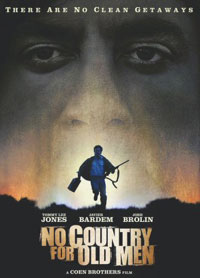 With a look more resembling Blood Simple (1984) than anything the Coen brothers have done since, No Country for Old Men (2007) initially seems a throwback to the directors' monumental youthful genius. But where every eccentric cruel event seemed whimsical in Blood Simple (1984), this time through it's incomprehensible evil. With a look more resembling Blood Simple (1984) than anything the Coen brothers have done since, No Country for Old Men (2007) initially seems a throwback to the directors' monumental youthful genius. But where every eccentric cruel event seemed whimsical in Blood Simple (1984), this time through it's incomprehensible evil.
Cowboy Llewellyn Moss (Josh Brolin) discovers drug runners slaughrtered in the desert. He makes no effort to help the one still living (Chip Love), but tracks who he assumes was the killer. He finds that guy dead, too, & so takes the dead man's satchel of drug money home to keep.
But enough guilt overcomes him that night that he gets himself a milk bottle of water & heads back for the one man not dead. Thereby he ends up in a world more trouble than would otherwise have come his way.
He survives the night but knows someone will be coming. He sends his wife Carla Jean (Kelly Macdonald) to the hoped-for safety of her mom (Beth Grant), & sets out on his own to see this through.
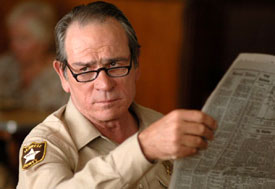 What he doesn't yet know is that the guy coming for him makes the whole idea of a villain look like a friendly neighbor. What he doesn't yet know is that the guy coming for him makes the whole idea of a villain look like a friendly neighbor.
Meanwhile the Sheriff (Tommy Lee Jones in a typecast role he does well) & his deputy (Garret Dillahunt) are putting together the clues for a series of crimes.
A trail of dead leads one coprse to the next. From the looks of things, the lawmen get a pretty good idea the next victim will be Lewellyn.
Now all the key characters are in play. It only remains for us to watch them on their descent into hell, with a demonic killer alwalys at the center of everyone's welling fear.
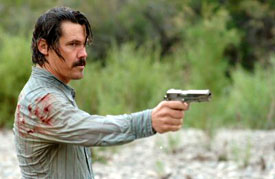 There is one more character of transient consequence. Mr. Wells (Woody Harrelson) is hired by criminal interests to track down Chigurh pronouced Sugar (Javier Bardem). There is one more character of transient consequence. Mr. Wells (Woody Harrelson) is hired by criminal interests to track down Chigurh pronouced Sugar (Javier Bardem).
So we're led to believe we've got Superkiller vs. Superkiller in the making, though instead it turns laugh-out-loud funny & sick, sick, sick. Wells doesn't last long, & Llewellyn's wife is at risk by then as well, when unexpectedly the unwaveringly murderous Chigurh makes his dubious deal.
Llewellyn won't give in. Instead, he says, "I've decided to make you my special project," & is going to take on the superkiller who even another superkiller couldn't stop. Llewellyn's more pigheaded rather than greedy in all this, coming close to the nature of Cool Hand Luke (1967).
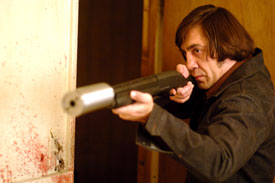 It will all work out grotesquely enough with great scenes for the Sheriff & for Llewellyn keeping it exciting. It will all work out grotesquely enough with great scenes for the Sheriff & for Llewellyn keeping it exciting.
Javier Bardem as Chigurh is a riveting villain with a terrible, terrible weapon ordinarily used to stave in the skulls of cattle for slaughter.
He's one of cinema's more extreme psychopaths, & this bigger-than-reality performance somewhat disguises the fact that Brolin & Jones are who make the whole thing work. Both are men of few words but enormous presence, & their emotional states matter as much as their actions, wheres Chigurh is an elemental whose interior world is of only passing consequence.
The violence is graphic but can't really call this exploitation. Based on a novel by Cormac McCarthy, adapted by the film's brilliant screenwriter-directors, it retains a literary flare even as the story that unfolds regards the effect of a psycho on the characters he stalks. We have credible characters facing the all-too-human equivalent of a Universal movie monster.
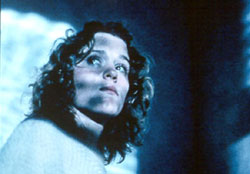 Ever since I saw Blood Simple (1984) at the Seattle International Film Festival, I've sung the praises of the Coen brothers, & find myself at this moment wanting to wax nostalgic on their oeuvre. Ever since I saw Blood Simple (1984) at the Seattle International Film Festival, I've sung the praises of the Coen brothers, & find myself at this moment wanting to wax nostalgic on their oeuvre.
That first film of theirs had the most perfect balance of black comedy & intensity of suspense. There are so many nail-biting scenes that are at the same time amazingly funny, with neither the humor undermining the terror of a moment, nor the horrific nature of things negating the humor.
This perfect balance is in the writing & carried out by the acting, most especially Frances McDormand in her amazing screen debut as the damsel who refuses to stay distressed, & E. Emmet Walsh in the role of his lifetime as the good-old-boy bubba of an arch villain.
Such perfect balances have rarely been achieved in cinema, & memorable moments proliferate: Trying to wipe up blood-evidence that just smears wider & wider; the sound of a shovel dragged on concrete; pulling a corpse to the middle of a fresh-plowed field in the middle of the night leaving a trail like an arrow to the grave; the discovery that the dead man isn't dead & the terrible spur-of-the-moment decision that gets made; the deadly battle of wills through a hole in the wall; or that last water-drop moment of life when the villain realizes what's really happened & literally dies laughing... I bought it all as the most edge-of-your-seat thrills even while stifling giggles.
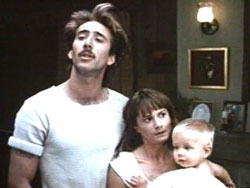 It would be tempting to be disappointed in their films to follow, as the perfected genius of what should have been their learning-process film was rarely quite equalled thereafter. It would be tempting to be disappointed in their films to follow, as the perfected genius of what should have been their learning-process film was rarely quite equalled thereafter.
Their second film couldn't've been further from Blood Simple's rebirth of Hitchock, going instead for high comedy in Raising Arizona (1987).
Nicholas Cage as an ex-con "Hi" kidnaps an infant so he & Holly Hunter as policewoman wife Ed(wina) can have a family. Soon they set off for one of the most deranged road pictures all time.
Beginning with their rationale for which kid to select -- that a family with quintuplets had kids to spare -- the couple's reasoning is forever the left hand of crazy. Yet you can't help but love 'em & root for 'em, even while laughing at, not with them. It's pure slapstick thus very little suspense, but two decades later it still wins laughter.
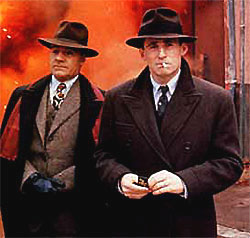 It only took two films to establish the Coens as old hands at the movie-making game. By the time they made their gangster classic Miller's Crossing (1990) they seemed as seasoned as John Huston at mid-career. It only took two films to establish the Coens as old hands at the movie-making game. By the time they made their gangster classic Miller's Crossing (1990) they seemed as seasoned as John Huston at mid-career.
Set during the Depression Era, with a classy & classic pictoriality, here's a world of rival mobs who own the police & can do pretty much anything they please.
t has some of the black humor of Blood Simple but is really much more a straight-faced homage to the great old Hollywood gangland movies, but with a headier dose of violence.
We only begin to see the chink in the armor of the Coen's genius with Barton Fink (1991) which is all style & very little content. The film is so visually on the upper edge of art it's hard to believe it's all so damned meaningless, but it just never adds up to anything.
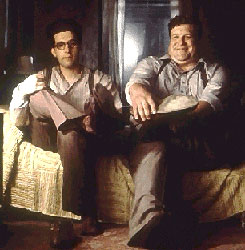 John Turturo plays a 1940s Hollywood writer with writer's block whose world becomes much to surreal to convey much of a story. Turturo is a Coen brothers regular, but often a weak link in their casting. Here he looks the role, but it would've had to have been a silent movie to work. John Turturo plays a 1940s Hollywood writer with writer's block whose world becomes much to surreal to convey much of a story. Turturo is a Coen brothers regular, but often a weak link in their casting. Here he looks the role, but it would've had to have been a silent movie to work.
Turtoro can in no way carry this film with his dopy mugging, so that the film is stolen from him by the first couple facial expressions of John Goodman, standing in for E. Emmet Walsh from Blood Simple as the apparent bumpkin with so much more to him, most of it scary.
Sorry fact is, when the haunted wallpaper is a fuller character than Barton Fink, Turturo has failed his task. But with such awesome support players as Goodman, Tony Shaloub, Judy Davis, & Steve Buscemi, it's no wonder it went over well in Cannes despite the mediocre lead. The story is still just not much of a story & I regard Barton Fink a sort of "bridge" between films of the Coens that are brilliant, & films that fail.
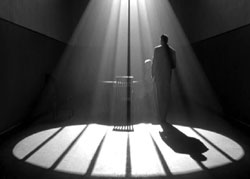 The Man Who Wasn't There (2001) was on some level a re-do of Barton Fink with its hotel setting. The Man Who Wasn't There (2001) was on some level a re-do of Barton Fink with its hotel setting.
It's a black & white film that never for a moment captures the film noir mood despite "insider" fan references to classic film noirs, & a lot of influence from James M. Cain novels. Cinematographer Roger Deakins tried but could not capture a visual mood that required artful lighting technicians, not just stripping the color out of the images.
The barber protagonist is played by the often-great actor (Billy Bob Thornton). For this role he remains so pokerfaced that the Coens could've cast a cigar store wooden Indian & got as much out of him.
The barber's banal excuse for blackmail; his roll-over-play-dead response to verbal abuse; his inability to convince anyone that he & not his drunken wife is the killer...it boils down to a parody of a pokerface & not the real deal, a completely inaccessible paper-cut-out character.
And like Barton Fink the film wants to rely on characterization & acting rather than a good story, resulting in a two-legged milking stool. A Twilight Zone surrealist coda to all the lowkey crazy events is not so much a twist to the tale but a slap in the face of all viewers waiting for the story to come together by the end.
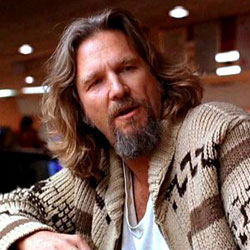 The Big Lebowski (1998) likewise failed to tell a story of merit, & yet it's a great film without one. Jeff Bridges plays Jeffrey "The Dude" Lebowsky with such laid back dufus conviction that just as a character performance it is riveting & very, very funny. His adventures in bowling never ceases to be worth a smile. The Big Lebowski (1998) likewise failed to tell a story of merit, & yet it's a great film without one. Jeff Bridges plays Jeffrey "The Dude" Lebowsky with such laid back dufus conviction that just as a character performance it is riveting & very, very funny. His adventures in bowling never ceases to be worth a smile.
The less said the better about The Ladykillers (2004), the Coens' one unqualified failure, mainly the fault of a terrible performance by Tom Hanks as the ringleader planning a casino heist amidst a comedy-of-errors. Their "innocent" landlord accidentally kills his crew one by one.
It might've been perfect Coen material but their territory is usually a bit more subtle in the yucks deparatment. They were clearly in confusing territory remaking an Ealing Studios classic. And Tom Hanks, though a credible actor in other films, made some choices that can only be described as awful. See the Ealing original instead, this one's such a waste of time that the Coens should've had their name removed.
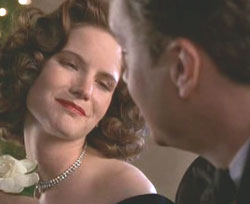 A more intriguing film is The Hudsucker Proxy (1994), the most intellectual of the Coens' comedies. Tim Robbins is a business graduate stuck in the mail room, with a dream connected to an invention he believes in but which is totally ridiculous. A more intriguing film is The Hudsucker Proxy (1994), the most intellectual of the Coens' comedies. Tim Robbins is a business graduate stuck in the mail room, with a dream connected to an invention he believes in but which is totally ridiculous.
The story is cribbed in part from Mel Brooks' The Producers (1968). It's obvious that a circle of plastic is as stupid an idea for a toy as anyone ever came up with.
By putting the mail room dreamer in charge, the company stocks will collapse in value, permitting corrupt board members to buy up the company on the cheap. That the hoola hoop becomes a fad that increases stock values gets in the way of the big plan.
Hudsucker is at the same time an old-fashioned Hollywood "screwball comedy" with Jennifer Jason Leigh having one of her best roles as the fast-talking reporter seemingly patterned on Myrna Loy in the Thin Man series.
Then there are the visual highlights inspired by Hitchock's penchant for "big" scenes & big objects. A delightful film, doing everything right except commerciality. Nothing about it said "box office success" & alas it wasn't.
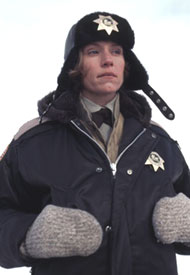 A fine lot of films with even the duds artful, Ladykillers not wistanding. Yet it remains, none of the above equalled Blood Simple. A fine lot of films with even the duds artful, Ladykillers not wistanding. Yet it remains, none of the above equalled Blood Simple.
Fortunately for the Coens, they were not doomed to live forever in their own shadow, because they came up one of the great black-comedy thrillers of all time in Fargo (1996).
Starring Frances McDormand, who after Blood Simple married into the Coen clan, she's a pregnant police chief with the innocence & tenacity of Columbo in her desire to close a horrifying murder case.
That it is a deeply sad & moving story negates any worry that humor could undermine the seriousness of the events. But there are moments so understated in their high comedy that it's hard to know whether to laugh out loud, or wince at the folly of so many unfortunate people. William H. Macy as the tragic used car salesman is especially powerful a support player. Steve Park as an authentic Japanese bubba is both a riot & a sorrow.
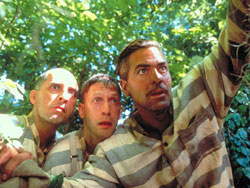 Another of their commercial successes was also an artistic triumph. O Brother Where Art Thou (2000) transforms Homer's Odyssey into a hillbilly epic built around some tremendously good music. Another of their commercial successes was also an artistic triumph. O Brother Where Art Thou (2000) transforms Homer's Odyssey into a hillbilly epic built around some tremendously good music.
There is only one flaw, the unconvincing casting of Coen brothers' regular John Turturro as a mountain hick just about kills the credibility.
Turturo never ceases to seem to have stepped out of a neighborhood in New York. But George Clooney delivers sheer comic genius & is riveting as a self-important criminal-minded hick who is simultaneously an incarnation of Ulysses. Most of the support actors are great, but George positively gleams from the screen.
And mostly there's that music so well chosen & performed that millions of viewers were instantly transformed into bluegrass fans though they may never have paid attention to such music before. Ralph Stanley singing "O Death" is just the tip of a mountain of greatness. And who would of thought directors who are masters of violence & dark, dark comedy would also be masters of the musical.
copyright © by Paghat the Ratgirl
|
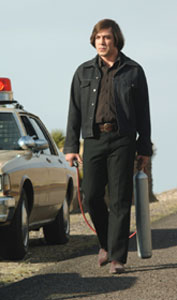

 What he doesn't yet know is that the guy coming for him makes the whole idea of a villain look like a friendly neighbor.
What he doesn't yet know is that the guy coming for him makes the whole idea of a villain look like a friendly neighbor. There is one more character of transient consequence. Mr. Wells (Woody Harrelson) is hired by criminal interests to track down Chigurh pronouced Sugar (Javier Bardem).
There is one more character of transient consequence. Mr. Wells (Woody Harrelson) is hired by criminal interests to track down Chigurh pronouced Sugar (Javier Bardem). It will all work out grotesquely enough with great scenes for the Sheriff & for Llewellyn keeping it exciting.
It will all work out grotesquely enough with great scenes for the Sheriff & for Llewellyn keeping it exciting.
 It would be tempting to be disappointed in their films to follow, as the perfected genius of what should have been their learning-process film was rarely quite equalled thereafter.
It would be tempting to be disappointed in their films to follow, as the perfected genius of what should have been their learning-process film was rarely quite equalled thereafter. It only took two films to establish the Coens as old hands at the movie-making game. By the time they made their gangster classic Miller's Crossing (1990) they seemed as seasoned as John Huston at mid-career.
It only took two films to establish the Coens as old hands at the movie-making game. By the time they made their gangster classic Miller's Crossing (1990) they seemed as seasoned as John Huston at mid-career. John Turturo plays a 1940s Hollywood writer with writer's block whose world becomes much to surreal to convey much of a story. Turturo is a Coen brothers regular, but often a weak link in their casting. Here he looks the role, but it would've had to have been a silent movie to work.
John Turturo plays a 1940s Hollywood writer with writer's block whose world becomes much to surreal to convey much of a story. Turturo is a Coen brothers regular, but often a weak link in their casting. Here he looks the role, but it would've had to have been a silent movie to work. The Man Who Wasn't There (2001) was on some level a re-do of Barton Fink with its hotel setting.
The Man Who Wasn't There (2001) was on some level a re-do of Barton Fink with its hotel setting.
 A more intriguing film is The Hudsucker Proxy (1994), the most intellectual of the Coens' comedies. Tim Robbins is a business graduate stuck in the mail room, with a dream connected to an invention he believes in but which is totally ridiculous.
A more intriguing film is The Hudsucker Proxy (1994), the most intellectual of the Coens' comedies. Tim Robbins is a business graduate stuck in the mail room, with a dream connected to an invention he believes in but which is totally ridiculous. A fine lot of films with even the duds artful, Ladykillers not wistanding. Yet it remains, none of the above equalled Blood Simple.
A fine lot of films with even the duds artful, Ladykillers not wistanding. Yet it remains, none of the above equalled Blood Simple. Another of their commercial successes was also an artistic triumph. O Brother Where Art Thou (2000) transforms Homer's Odyssey into a hillbilly epic built around some tremendously good music.
Another of their commercial successes was also an artistic triumph. O Brother Where Art Thou (2000) transforms Homer's Odyssey into a hillbilly epic built around some tremendously good music.